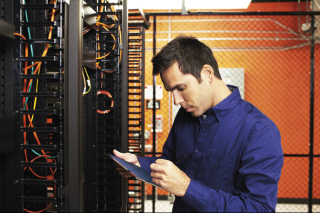Guest Blog: Private Network and PC Security
When you have two computers or a computer and other devices, such as a printer or router connected, you have created a network. When this network is not connected through the internet, you have a private network, whether it is at home or in your small office. A private network is one of the highest levels of security that you can have for your computer, as it does not have access to the internet, which means no one can see your computer from the outside. While this does ensure a certain level of security, it is still important to control the security of your computers and other devices in order to prevent them from being hacked by unauthorized users.
What is Network Security?
When you protect your network, you are protecting your computer from unauthorized use. This means that you are protecting your passwords from being stolen and any data on your computer from being seen or used. Even if your computer is not used for anything that you consider “top secret,” chances are you have used it to pay a bill, shop, or even send emails. All of this information is considered to be private and should be protected from unnecessary attention. Sometimes your network security is necessary simply to protect people from gaining access to your computer to maliciously attack other computers. While you are protecting your computer, you should also use free cloud
antivirus for protecting Windows to protect your computer from internet hacks if someone else gains access to your computer.
Any Computer is at Risk
All too often, homeowners get comfortable, assuming that their computer is not at risk for a malicious security breach. Unfortunately, no computer is safe. Intruders who have an attack in mind will take advantage of any unsecured computer that will allow them to perform their attack. Any computer that is not properly secured could be at risk for this type of behaviour.
Password Protection is Important
When you choose the passwords for your computer, they need to be carefully selected. Your computer should have several passwords in order to make it more difficult to gain access to your computer. The passwords should start with the BIOS. If changes are allowed to be made to your BIOS, you are leaving your computer at serious risk for damages. In addition, you should set passwords to access the data on your computer, as well as the ability to gain access once the screen saver is activated on your computer. You don’t want to risk anyone being able to access your data just because you walked away from your computer for a few minutes.
Change your Passwords Often
It is not enough to have many passwords set on your computer. You need to know how to protect them. It is very important to change your passwords often. Some people change them as often as once a month, but you should choose an interval that you will habitually stick to for the long term. As you change your passwords, you will need to keep careful track of the changes. Make sure to keep the list of your new passwords away from your computer in the event that it becomes prone to unauthorized access. This allows you to keep a tighter control on your computer without losing the passwords yourself. When you set your new passwords, make sure they are not words or phrases that are easy to guess and include a good combination of capital and lowercase letters as well as numbers or symbols if they are allowed.
Encrypt your Data
Any data that is very important should be encrypted. This will ensure that even if someone were able to hack into your computer, they will not have access to your sensitive information. There are a variety of free encryption programs available through Windows to help make encryption easy. In addition, you should run a cleaner program that will ensure that any deleted information is permanently deleted and not able to be accessed by anyone.
Your physical computer and network is at risk of being hacked, even if you think you have done everything possible. From protecting your computer with passwords to using the free Cloud antivirus for protecting Windows, you can help keep your computer and your data as safe as possible. Even if you think that you have a simple home network that does not require any type of security, you should take the extra steps necessary to ensure that your computer, passwords and data are safe at all times in order to prevent unauthorized access to your computer and sensitive information.
Author Bio
James has been associated with the IT industry for the past 5 years. He is working as a tech support specialist in NYC. Besides system troubleshooting, he loves to write articles related to computer security and educates people about cloud antivirus software in order to keep their PC safe from malware and viruses.
